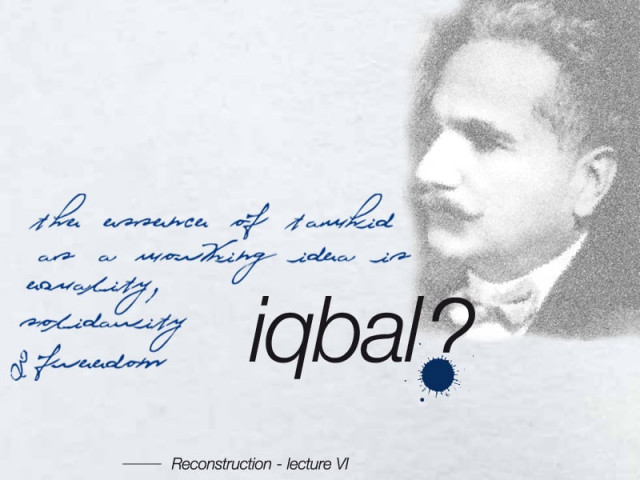Re-reading history: Who wants to be enlightened by Iqbal?
Iqbal's philosophy is a tool for training the minds for looking into the conscience of nations and humanity.

Re-reading history: Who wants to be enlightened by Iqbal?
Iqbal was on his way to the Third Round Table Conference, which was going to be held in London at the end of 1932.
In Bombay, a representative of the Roznamah-e-Khilafat asked him on his position if the Hindu majority of British India accepted 13 out of the 14 points of Jinnah but did not concede to separate electorates. Iqbal replied, “In my opinion, the Musalmans do not want to give up separate electorates…” The representative asked what Iqbal would say if the Muslim majority thought otherwise at the forthcoming conference. Iqbal’s answer was, “Then I, too, shall abide by that decision and will not work against it.”
In a nutshell, this is how Iqbal was different from most of the educated ones who live in his country today. On an issue which he regarded to be a matter of life and death for Islam in India, he was willing to “abide by” the decision of the nation, even if the decision favoured what he considered to be collective suicide.
Seeking consensus, and respecting it, was a principle he upheld not only as a politician but also as a poet, philosopher and social activist. Even when proposing the birth of a new state, which appeared to him to be “the final destiny” of his people, he started his presidential address by saying: “I propose, not to guide you in your decisions, but to attempt the humbler task of bringing clearly to your consciousness the main principle which, in my opinion, should determine the general character of these decisions.”
This may explain to a great extent why his legacy is so enduring. It may also explain why it has been misunderstood so monstrously by academics, alike in Pakistan and the West.
We tend to find a definite ideology in his writings, whereas he is more of an educator. His philosophy is a tool for training the minds for looking into the conscience of nations and humanity. Since this conscience is ever-changing and always bringing forth new possibilities unknown before, we can only call it a dynamic ideology—if we must call it an ideology at all.
The basic principles, which he offers to us for seeing the world, may be divided broadly into five domains of knowledge: history, art and literature, politics, religious thought and education (and various fields associated with each of these). Even a cursory look at the fundamental principles propounded by him in any of these domains would show us how our outlook on the world is exactly the opposite of how he wanted us to view things.
For instance, the two fundamental principles of history, according to him, are that the entire humankind is evolving like a single organism and that this evolution can only lead to perpetual improvement on the whole (see, for instance, the fifth lecture in The Reconstruction of Religious Thought in Islam).
Ironically, we do not see our times in this light and that brings us in a conflict with Iqbal’s take on literature. According to him, literature is like a collective dream that comes true. Therefore, the purpose of literature is to present an ideal world—it should give us imagined situations where things get sorted out due to the true potential hidden in human beings.
Hence, politics itself can seldom change destinies. Politics, good or bad, can do nothing more than turning into reality the dreams or nightmares which people have chosen through literature. “Nations are born in the hearts of poets,” Iqbal wrote in his private notebook in 1910. “They prosper and die in the hands of politicians.”
Therefore, the ‘Unity of God’ is not a dogma to him. “The essence of Tawhid, as a working idea, is equality, solidarity, and freedom,” he famously stated in the sixth lecture of the Reconstruction. Elsewhere, he expanded the concept into a book-length Persian poem.
The most daring implication of this last statement is that the three highest ideals over which the Western civilisation has consensus (equality, solidarity and freedom) are the very essences of Muslim faith “for which even the least enlightened man among us can easily lay down his life.” If so, then the much-touted “clash of civilisations” is an impossibility in our times, and a figment of somebody’s imagination. The real problem must be something else, somewhere else.
The real promise of Iqbal as a teacher is that he can help us locate that real centre of problems in our time, and to correct the problems with the least resentment to the many. Khurram Ali Shafique is the author of Iqbal: an Illustrated Biography (2006) and offers online courses in Iqbal Studies for Iqbal Academy Pakistan. khurramsdesk@gmail.com
Published in The Express Tribune, November 9th, 2012.



















COMMENTS
Comments are moderated and generally will be posted if they are on-topic and not abusive.
For more information, please see our Comments FAQ